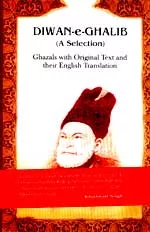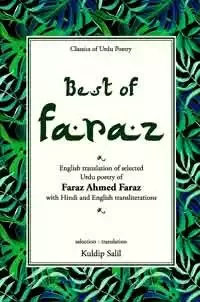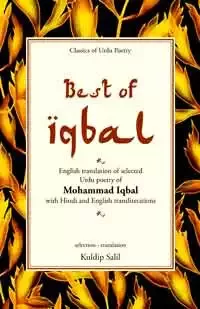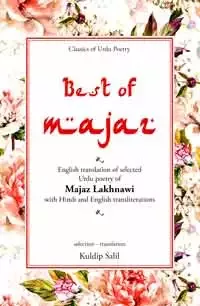|
गजलें और शायरी >> दीवान ए गालिब दीवान ए गालिबकुलदीप सलिल
|
32 पाठक हैं |
||||||
Ghazals with original text and their english translation.
Ghazals with original text and their english translation.
‘‘With
Meer, Ghalib, Iqbal and Faiz, to name only
four, the firmament of Urdu poetry is truly star-studded, with numerous
starlets strewn around. Ghalib has not only a pride of place
among them; his stature is growing with every passing decade he got
less than his due in his own time. He was ahead of his age,
and his contemporaries failed to comprehend him fully. But it was
really when India (and Pakistan) celebrated his first death centenary
in 1969 that he was rehabilitated as a great poet he is. There has been
no looking back after that. As with other great poets like Shakespeare,
one discovers a new wealth of meaning every time one reads him, and
different people find different meaning, suiting their need and
situation. In other words, great poets are inexhaustible in their
appeal and meaning and do not get dated even when they mirror their
times most effectively. Ghalib’s writings are not only an
authentic account of his own age, his poetry transcends his times and
situation. It is universal in its appeal.’’
Ghalib is the greatest Urdu poet and one of the greatest in any Indian language. He would rank perhaps among the great poets of the world.
In fact, it is well-nigh impossible to do full justice to his poetry, particularly the ghazals in translation. The best that could be done was to translate the verse into independent rhymed couplets. Also, I have tried to be faithful to the original. This is a selection of the best and most popular ghazals from Diwan-e-Ghalib.
For the convenience of readers original Ghazals have been given in Hindi as well as in Roman script. Meanings of difficult Urdu words have also been given.
Ghalib is the greatest Urdu poet and one of the greatest in any Indian language. He would rank perhaps among the great poets of the world.
In fact, it is well-nigh impossible to do full justice to his poetry, particularly the ghazals in translation. The best that could be done was to translate the verse into independent rhymed couplets. Also, I have tried to be faithful to the original. This is a selection of the best and most popular ghazals from Diwan-e-Ghalib.
For the convenience of readers original Ghazals have been given in Hindi as well as in Roman script. Meanings of difficult Urdu words have also been given.
हजारों ख़्वाहिशें ऐसी, कि हर ख़्वाहिश पे दम निकले
बहुत निकले मेरे अरमान, लेकिन फिर भी कम निकले
निकलना ख़ुल्द से आदम का सुनते आये थे, लेकिन
बहुत बेआबरू हो कर तिरे कूचे से हम निकले
हुई जिनसे तवक़्क़ो, खस्तगी की दाद पाने की
वो हम से भी ज़ियादा ख़स्त-ए-तेग़े-सितम निकले
मुहब्बत में नहीं है फ़र्क, जीने और मरने का
उसी को देखकर जीते हैं, जिस काफ़िर पे दम निकले
बहुत निकले मेरे अरमान, लेकिन फिर भी कम निकले
निकलना ख़ुल्द से आदम का सुनते आये थे, लेकिन
बहुत बेआबरू हो कर तिरे कूचे से हम निकले
हुई जिनसे तवक़्क़ो, खस्तगी की दाद पाने की
वो हम से भी ज़ियादा ख़स्त-ए-तेग़े-सितम निकले
मुहब्बत में नहीं है फ़र्क, जीने और मरने का
उसी को देखकर जीते हैं, जिस काफ़िर पे दम निकले
Hazaron Khwahishen aisi ki her khwahish pe dum nikle
Bahut nikle mere armaan, lekin phir bhi kum nikle
Nikalna khuld se aadam ka sunte aaye the, lekin
bahut beaabru ho kar tirey kuche se hum nikle
Hui jinse tawaqqo, khastagi ki daad pane ki
woh humse bhi jiyada khast-e-tege-sitam nikle
Muhabbat mein nahin hai farq, jine aur marne ka
usi ko dekh kar jite hai, jis kafir pe dum nikle
Bahut nikle mere armaan, lekin phir bhi kum nikle
Nikalna khuld se aadam ka sunte aaye the, lekin
bahut beaabru ho kar tirey kuche se hum nikle
Hui jinse tawaqqo, khastagi ki daad pane ki
woh humse bhi jiyada khast-e-tege-sitam nikle
Muhabbat mein nahin hai farq, jine aur marne ka
usi ko dekh kar jite hai, jis kafir pe dum nikle
Thousands of desires, life-consuming and tough
I had them fulfilled in plenty, but not enough
Expulsion of man from paradise we had known
But how disgracefully from your street we’ve been thrown
The people, who we thought, would commiserate with us in distress
Themselves turned to be more oppressed, not less
In love, there is no difference between life and death
We die for the same infidel who is our life’s breath
I had them fulfilled in plenty, but not enough
Expulsion of man from paradise we had known
But how disgracefully from your street we’ve been thrown
The people, who we thought, would commiserate with us in distress
Themselves turned to be more oppressed, not less
In love, there is no difference between life and death
We die for the same infidel who is our life’s breath
|
|||||
अन्य पुस्तकें
लोगों की राय
No reviews for this book













